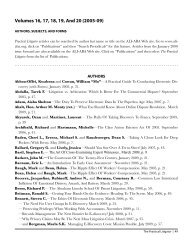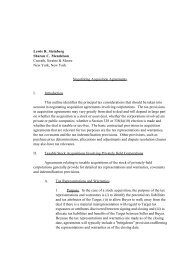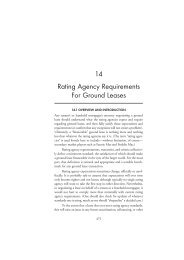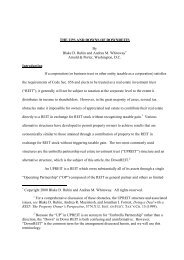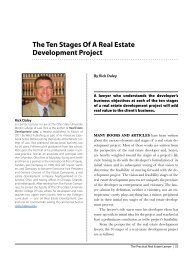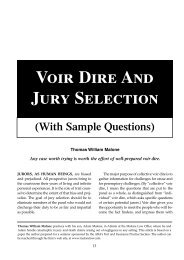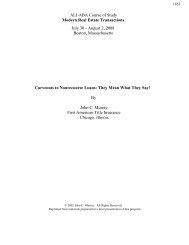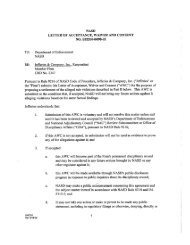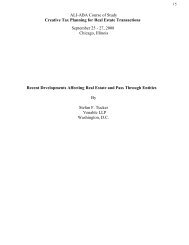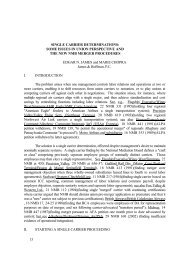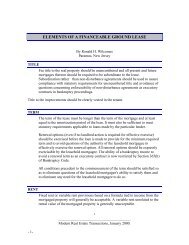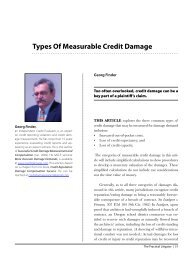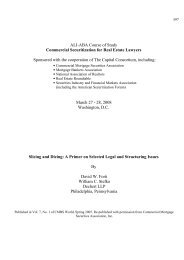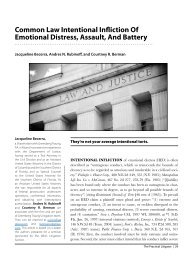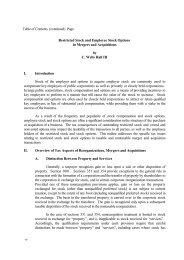The Consequences Of Failure To Respond To Requests For ...
The Consequences Of Failure To Respond To Requests For ...
The Consequences Of Failure To Respond To Requests For ...
You also want an ePaper? Increase the reach of your titles
YUMPU automatically turns print PDFs into web optimized ePapers that Google loves.
24 <strong>The</strong> Practical Litigator May 2006<br />
that admission might be used against your<br />
client. One of the most serious consequences of<br />
failing to respond to requests for admission is<br />
that the requests are “deemed admitted,” and<br />
you will be unable to dispute those matters at<br />
trial. Worse yet, you may never get to trial if<br />
those admissions warrant the entry of summary<br />
judgment in your opponent’s favor.<br />
Responses to requests for admission are<br />
generally “Admit,” “Deny,” or “Unable to admit<br />
or deny.” Depending on the jurisdiction,<br />
additional factual support for responses other<br />
than “Admit” may be required. Alternatively,<br />
you can assert objections. When objections are<br />
asserted, however, the party propounding the<br />
requests for admission can move to compel<br />
further responses. American Federation of State,<br />
County & Municipal Employees v. Metropolitan<br />
Water Dist., 24 Cal. Rptr. 3d 285, 300-01 (Cal. Ct.<br />
App. 2005).<br />
WHAT CONSTITUTES A FAILURE TO RE-<br />
SPOND? • <strong>The</strong> most egregious failure to respond<br />
to requests for admission is the failure<br />
to serve any responsive document at all. <strong>The</strong><br />
legal effect of that omission can be that each of<br />
your opponent’s requests is deemed admitted.<br />
<strong>The</strong>re are other ways you might fail to respond,<br />
however:<br />
• Failing to serve a timely response. California<br />
Code of Civil Procedure section 2033.280;<br />
Wilcox v. Birtwhistle, 987 P.2d 727, 730-31 (Cal.<br />
1999); New York Civil Practice Law and Rules<br />
section 3123(a);<br />
• Failing to provide a client’s verification of<br />
the response. New York Civil Practice Law and<br />
Rules 3123; ELRAC, Inc. v. McDonald, 720<br />
N.Y.S. 2d 912 (N.Y. Sup. Ct., 2001); California<br />
Code of Civil Procedure section 2033.210 and<br />
section 2033.240; Thomas v. Makita, U.S.A., Inc.,<br />
226 Cal. Rptr. 413, 415 (Cal. Ct. App.1986);<br />
• Failing to provide the response in the proper<br />
format is a ground for deemed admissions<br />
only if the response is substantively defective.<br />
<strong>For</strong> example, in New York, it is insufficient to<br />
respond informally in a letter, but only because<br />
such correspondence would lack the required<br />
client verification. New York Civil Practice<br />
Law and Rules section 3123; ELRAC, supra.<br />
Similarly, in California, the statute provides a<br />
detailed description regarding the format for<br />
the response, California Code of Civil Procedure<br />
section 2033.210. However, the response<br />
is actionable only if the deficiency is a failure to<br />
respond fully and accurately to each request.<br />
American Federation, supra, 24 Cal. Rptr. 3d at<br />
300-01;<br />
• Finally, failing to explain the factual basis<br />
for a denial or the reason you cannot admit or<br />
deny a request when that information is required<br />
also constitutes a failure to respond.<br />
New York Civil Practice Law and Rules section<br />
3123(a). You must be judicious in responding<br />
that you are unable to admit or deny a request<br />
based on a lack of information. Although it is<br />
true that one party is not required at his or her<br />
expense to prepare the opponent’s case, the responding<br />
party is required to conduct a reasonable<br />
investigation of the facts to provide an<br />
adequate response. Lindgren v. Superior Court of<br />
Los Angeles County, 47 Cal. Rptr. 298, 301-02<br />
(Cal. Ct. App. 1965).<br />
<strong>The</strong> statute governing requests for admission<br />
should specify the extent to which an explanation<br />
for responses is required. In New<br />
York, the governing statute requires an explanation<br />
for all responses that are not an unqualified<br />
admission, including a statement setting<br />
forth in detail the reasons why the matter<br />
could not be admitted or denied. New York<br />
Civil Practice Law and Rules section 3123(a).<br />
By contrast, in California, only the short answers<br />
and objections are to be included in the<br />
response to requests for admission. California<br />
Code of Civil Procedure section 2033.210(b).<br />
An explanation of any response that was not



